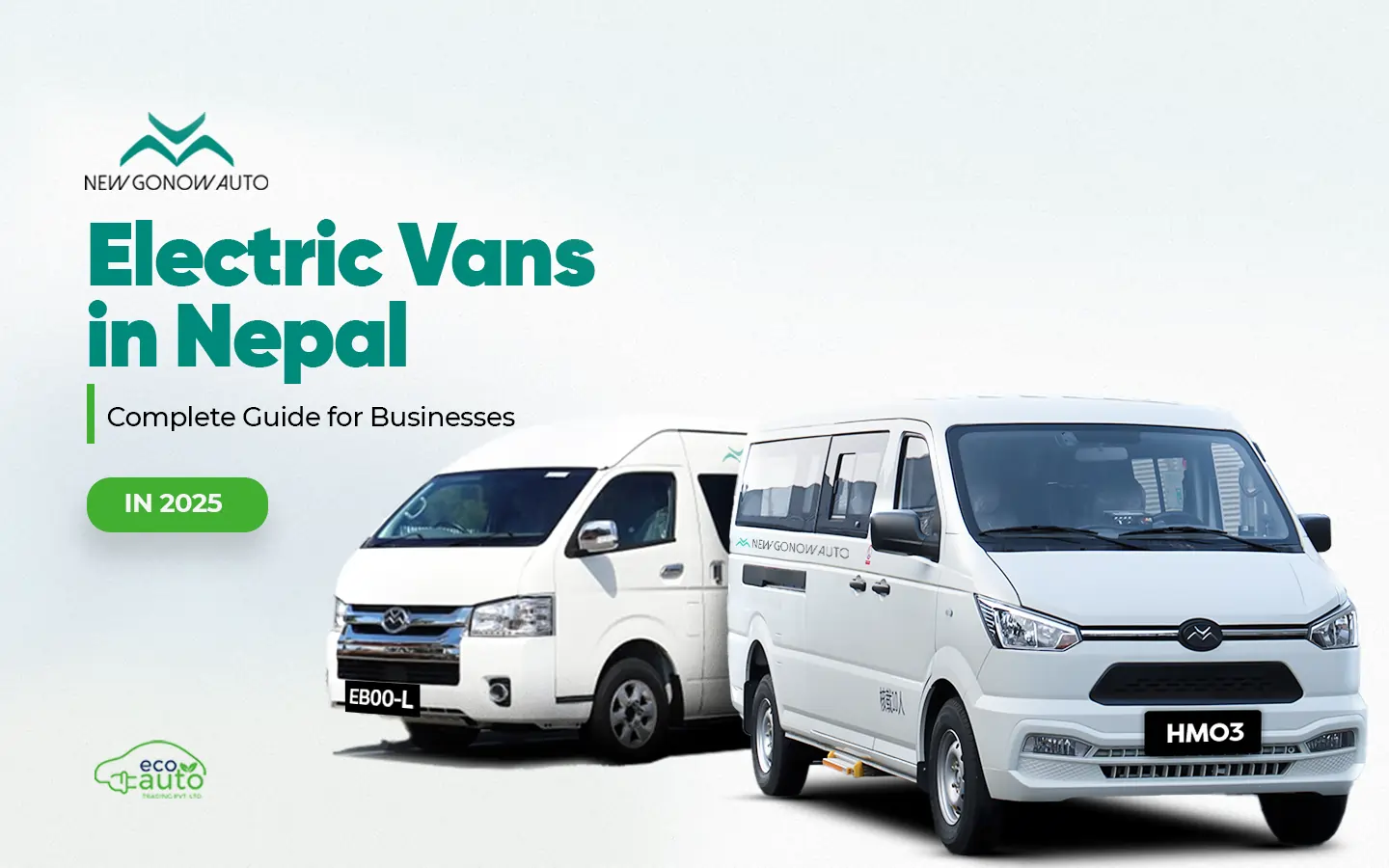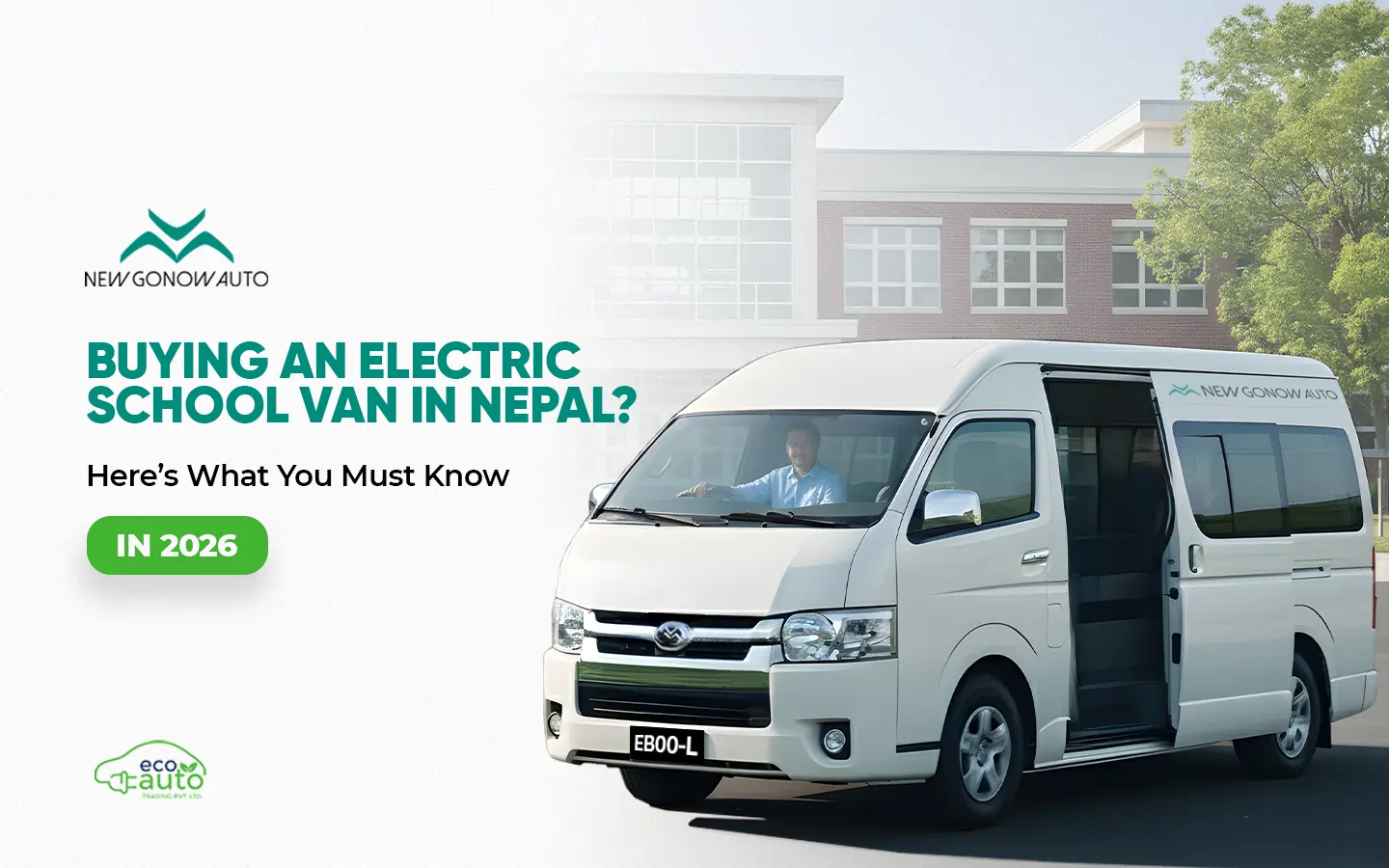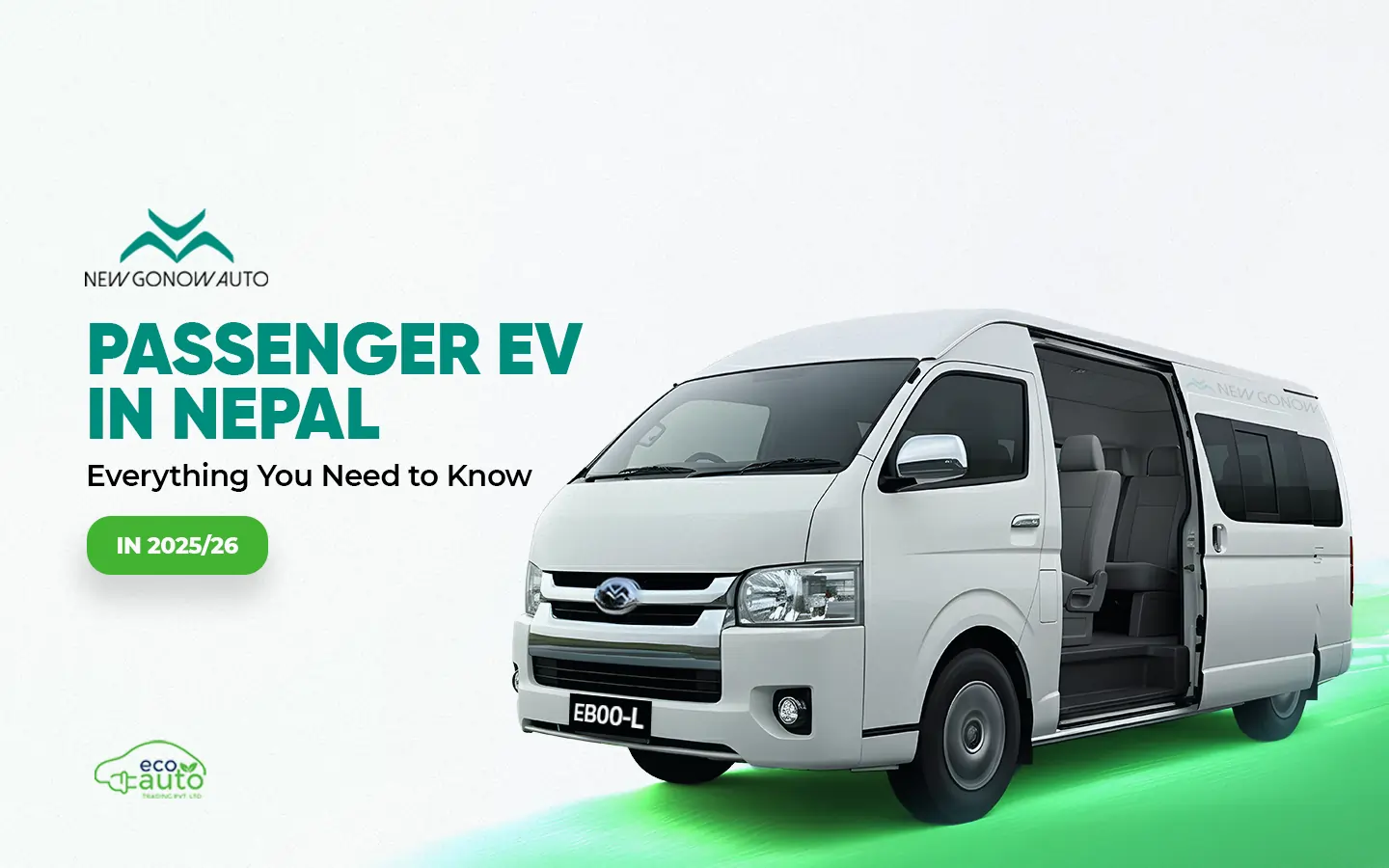
Electric Vans in Nepal 2025: Complete Guide for Businesses
In 2025, EV vans in Nepal are becoming the backbone of sustainable business transport. As fuel prices rise and the government promotes clean energy, more companies are switching to electric vans for logistics, schools, and tourism. In this guide, you’ll find the latest EV van prices in Nepal, top models, and everything businesses need to know before investing in electric transport.
Electric vans are disrupting the logistics and delivery sector, school transport and passenger sector. The demand in urban centres such as Kathmandu, Pokhara, and Biratnagar is increasing especially due to the need to have a reliable, clean, and cost-efficient mode of transport.
In this guide, you’ll learn about:
- What makes electric vans attractive in 2025: models and price points
- Benefits and cost savings for businesses
- Government policies & incentives
- Challenges and what the future holds
- Steps businesses can take to transition successfully
If you’re exploring eco‑friendly transport solutions Nepal, this is your detailed roadmap.
2. Why Electric and EV Vans Are Gaining Popularity in Nepal (2025)
- Infrastructure and Awareness: Charging stations are becoming more widespread; the attitude toward the harmfulness of fossil fuel is becoming more popular. The use of cleaner power (hydropower) increases the sustainability of electricity. There are approximately 400 charging stations in Nepal and more to be established.
- Business Owners Shifting Fleets: With the increased fuel prices and the reduced predictability of the operational expenses of ICE (Internal Combustion Engine) vans, companies are evaluating the battery-powered vehicles in Nepal as a long-term savings.
- Government Incentives: The government has reduced import taxes and offered exemptions to EVs and come up with policies to promote electric commercial vans Nepal such as the Green Mobility Policy. These policies render electric delivery vans in Nepal and other commercial EVs more cost-effective.
3. Top EV Van Models and Prices in Nepal (2025 Update)-Eco Auto Edition
As electric mobility grows rapidly in Nepal, Eco Auto Nepal has emerged as one of the leading distributors of commercial electric vans and minibuses. Their lineup of Gonow electric vans offers a perfect mix of power, capacity, and efficiency-ideal for passenger transport, school shuttles, and tourism services.
Below are some of the top electric van models available from Eco Auto in 2025, along with their specifications, prices, and primary use-cases.
Electric Van Prices in Nepal (2025 Update)
| Brand / Model | Seating / Capacity | Battery / Range | Price in Nepal* | Use Case |
| Gonow EB00 (16-Seater) | 16 seats | 86 kWh lithium battery, 110 kW motor, ~400 km range (CLTC) | ~NPR 7,000,000 | Ideal for school transport, urban shuttles, and group tours. |
| Gonow EB00L (19-Seater) | 19 seats | 86 kWh battery, 120 kW motor, ~350 km range (CLTC) | ~NPR 7,800,000 | Best for mass transport, tourism, and long-route group travel. |
| Gonow HM03-L (14-Seater) | 14 seats | 53.58 kWh battery, 60 kW motor, ~300 km range (est.) | ~NPR 5,450,000 | Compact van suited for schools, staff shuttles, and city transport. |
Source: Eco Auto Nepal
Eco Auto: Driving Nepal’s Electric Transport Forward
While Nepal’s EV market has largely focused on SUVs and smaller passenger cars, Eco Auto has filled a critical gap by offering electric commercial vans and minibuses suited for local businesses, schools, and tourism.
Their vehicles are designed for high efficiency, low operating costs, and eco-friendly operations making them perfect for companies transitioning toward sustainable transport.
Affordable and Practical Choices
Among Eco Auto’s lineup, the Gonow HM03-L stands out as an affordable yet capable 14-seater van, ideal for startups, private schools, or local shuttle operators looking to reduce fuel expenses.
For large-scale or intercity transport, the EB00 and EB00L offer longer range and higher passenger capacity, ensuring reliability on longer routes.
Why Choose Eco Auto Electric Vans
- Long Range & Efficiency: Up to 400 km range per charge for certain models.
- Durable Batteries: Powered by high-capacity lithium packs with fast-charging options.
- Modern Comfort: Spacious interiors with strong air conditioning and ergonomic seating.
- After-Sales Support: Dedicated servicing and parts availability through Eco Auto’s national network.
- Eco-Friendly: Zero tailpipe emissions, reducing pollution and fuel dependency.
Factors Affecting Electric Van Prices
- Battery Size & Chemistry: Larger batteries (e.g., 86 kWh) increase range but cost more.
- Vehicle Capacity: Vans with 16–19 seats cost more due to larger size and stronger motors.
- Technology & Features: Advanced features like regenerative braking and ABS improve performance but add to price.
- Import Duties: Customs and dealer markups affect final pricing in Nepal.
- Brand Reliability: Eco Auto’s partnerships with Gonow Electric ensure quality and long-term serviceability.
4. Top Benefits of Electric Vans for Businesses in Nepal
-
Lower Operating Costs: Save up to 60% on fuel and maintenance.
-
Eco-Friendly Fleet Branding: Boost CSR reputation with zero-emission vans.
-
Long-Term ROI: Reduced running costs balance higher upfront pricing.
- Brand & Regulatory Benefits: Businesses using electric delivery vans in Nepal or sustainable fleets can gain public goodwill, potential tax or incentive benefits.
These are core to what eco‑friendly transport solutions Nepal is offering and what businesses should aim for when evaluating for the EV fleet investment.
5. Government Policies & Incentives for EV Vans in Nepal
- Import duty / Tax Reductions: EVs pay less tax as compared to ICE cars. It involves cutting down customs and decreasing VAT/excise in most instances.
- Green Mobility Policy: The government is driving policies towards EVs, particularly, public, commercial, and cargo vehicles.
- Charging Infrastructure Plans: Nepal The expansion of charging networks in Nepal; the collaboration of the government and the business sector.
- Financing Support: There are financial institutions and banks that are providing good conditions on loans to purchase EVs especially commercial/electric vans fleets.
These policies make electric vehicles in Nepal more accessible and reduce the risk for businesses investing in electric commercial vans Nepal.
6. Challenges & Future of Electric Vans in Nepal
Challenges
- The number of charging stations is also limited in certain places especially in the rural/semi-urban routes.
- High start-up expenses of vans with high capacity (van categories that have high seats or space).
- Limited model line and components / service network particularly of recent brands.
- The problems of battery degradation and the consequences it would have on the resale value and expenses of operation.
Future Prospects
- They may be made available by local assembly or CKD (Completely Knocked-Down) units that would allow them to be kept at a lower cost.
- There will be more models entering the market, particularly electric cargo vans in Nepal and electric microbus in Nepal to use as a public or school transport.
- Improvements in technology: the battery density, rapid charging and the advances in safety and features will become usual.
- The resale price will stabilize as EVs gain more usage, and the used EV markets would become more predictable.
7. How Businesses Can Transition to Electric Vans
The following is a proposed plan that businesses can use to switch to electric fleets:
- Analyze fleet needs: How many vans are needed, what capacity should each van be, how many km/day is the van supposed to run, the routes and also the load types.
- Choose suitable electric models: Capacity (cargo passenger), battery, service, brand support.
- Plan charging solutions:Improve charging infrastructure (slow/fast), location, power, backup.
- Train drivers & staff: Good driving, battery, charging, safety.
- Apply for government benefits / incentives: Claim import tax breaks, grants, reduced custom duties.
- Monitor costs & performance: Track savings, maintenance costs, downtime; gather data for future investment.
This can assist the companies in including electric delivery vans in Nepal or battery-powered vehicles Nepal in the operations without any issues.
8. Conclusion
In Nepal, electric vans are no longer a farfetched concept but they are transforming the transport indus-try particularly among businesses. Among the bright prospects such as the Kevan vans of Karry, mass transportation avenues of Jagadamba Motors, the cost, incentives and infrastructure are all converging towards the sustainable fleets.
Now is the appropriate moment to invest in electric vans in Nepal as companies seek to reduce costs of operation, emissions, and be ahead of the regulations. The benefits associated with early adoption include long term savings, operational benefits and high impact on the environment.
Explore the latest electric vans in Nepal and make your business greener today with Eco-Auto.
FAQs
1. What is the price of electric vans in Nepal in 2025?
The prices for new 14‑19 seater electric vans are generally in the NPR 5.6 million to NPR 8 million range, depending on the brands, battery, and features as per the vehicle.
2. Are there electric vans for cargo use (not passengers) in Nepal yet?
By the middle of 2025, the majority of services are passenger or mixed-use vans. Electric vans that carry cargo only have fewer numbers but are projected to increase with the increase in demand.
3. How long does it take to charge large electric vans in Nepal?
It is determined by the presence of a fast (DC) charging. There are models and variants that support DC fast charging, which can accelerate charging. Slower AC charging is still prevalent. The time taken to charge should be incorporated in the planning of business.
4. Will government incentives cover most of the extra cost of electric vans vs diesel vans?
Incentives are beneficial, particularly through reduced importation duties and taxes, although all the increased initial costs are often not subsidized. ROI is dependent on usage rate, kilometers and load.
5. Which brands have good resale value or after‑sales support in Nepal?
Brands that offer official dealership networks and reliable after-sales service tend to retain higher resale value.
Eco Auto Nepal, as the authorized distributor of Gonow Electric, provides:
- Genuine spare parts
- Battery and motor warranty
- Trained service technicians
This strong after-sales ecosystem ensures better vehicle longevity and resale value compared to lesser-known imports.




